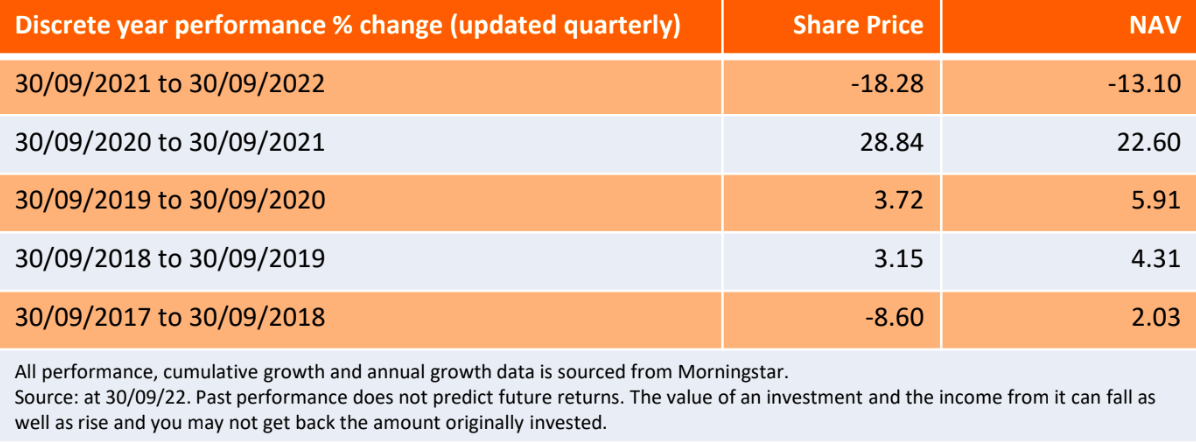
Please Note
From January, Henderson High Income Trust’s Commentary will be merged into the Factsheet. The new, and improved, merged Factsheet document will still be accessible via the ‘Quicklinks’ and ‘Documents’ sections on Henderson High Income Trust’s webpage.
Investment Environment
In the UK, the FTSE All Share Index was up 3.1% as investors welcomed the appointment of Rishi Sunak as prime minister, replacing Liz Truss. The latter resigned following the turmoil caused by her government’s tax-cutting plans. Mr. Sunak, the former Chancellor of the Exchequer, vowed to tackle the country’s economic challenges but remain fiscally responsible. Inflation hit a 40-year high of 10.1% in September, up from 9.9% in August. Relief over Mr. Sunak’s appointment, coupled with the U-turns on the tax-cutting policies, helped sterling strengthen against the US dollar in October. The FTSE 250 Index rebounded strongly, up 4.5% over the month, and it outperformed the FTSE 100 Index which returned 3.0%. More cyclical sectors performed well with consumer discretionary and industrials outperforming, while defensive sectors such as utilities, consumer staples and telecoms lagged.¹
Portfolio Review
The Company’s net asset value (with debt at fair value) rose 4.1% during October, outperforming the FTSE All Share Index (80%) & ICE BofA Sterling Non-Gilts (20%) Index benchmark’s return of 3.4%. Good performance within the equity portfolio and the positive impact of gearing benefited performance.
Within the equity portfolio, the positions in Imperial Brands and McDonald’s benefited performance. Imperial Brands announced a resilient trading update and its intentions to start a £1 billion share buyback program earlier than expected, while McDonald’s released robust results with strong revenue growth in its US and European divisions. The holdings in PageGroup and RELX were also positive for performance after the company’s quarterly trading statements. The buoyant jobs market in PageGroup’s territories continued to support strong profit growth in the last quarter, while RELX has benefited by recent investment in its Legal division, which has accelerated revenue growth in this business.
Elsewhere, the holding in Anglo American detracted from returns as commodity prices came under pressure from fears over a slowing Chinese economy, while the company also guided its full-year production targets lower.During the start of October, we took advantage of the dislocation in the bond market to purchase a number of investment grade corporate bonds on attractive yields, such as Nestle, Sky and Anheuser-Busch. We also added to our equity holding in Tesco.
Manager Outlook
The economic environment is the most challenging it has been for several years. It seems likely that the increase in interest rates that most central banks have undertaken to control inflation could lead to subdued economic growth, and potentially a recession in many countries. This is likely to result in earnings downgrades across a variety of sectors, with demand falling and costs rising. That said, there has already been meaningful weakness across markets, and employment and the financial system are in much better health than at the start of previous slowdowns.
Throughout the year we have been lowering gearing and increased the bond exposure. The equity portfolio has a bias towards defensive and more resilient businesses. Where there is cyclical exposure, it is generally in high-quality businesses or where the valuation appears to already be discounting a too bearish economic outcome in our view.

1Source: Bloomberg as at 31/10/2022
Bear market – A financial market in which the prices of securities are falling. A generally accepted definition is a fall of 20% or more in an index over at least a two-month period. The opposite of a bull market.
Inflation – The rate at which the prices of goods and services are rising in an economy. The CPI and RPI are two common measures. The opposite of deflation.
Recession – A recession is a significant, widespread, and prolonged downturn in economic activity. A popular rule of thumb is that two consecutive quarters of decline in gross domestic product (GDP) constitute a recession. Recessions typically produce declines in economic output, consumer demand, and employment.
Valuation metrics – Metrics used to gauge a company’s performance, financial health, and expectations for future earnings eg, price to earnings (P/E) ratio and return on equity (ROE).
Yield – The level of income on a security, typically expressed as a percentage rate. For equities, a common measure is the dividend yield, which divides recent dividend payments for each share by the share price. For a bond, this is calculated as the coupon payment divided by the current bond price.